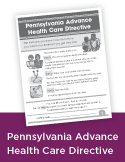Resources Outside of UPMC
- The Conversation Project — The Conversation Project is dedicated to helping people and their loved ones prepare for medical decision making. Check out the resources and tools specifically for faith leaders.
- PREPARE — The PREPARE website is designed to help people and their loved ones prepare for medical decision making.
- Advance Care Planning – Selected Resources from the Public – A selection of resources, including guides, workbooks, and toolkits compiled by the CDC.
- Aging with Dignity – Aging with Dignity is a private, non-profit organization that advocates for quality of care near the end of life.
- National Hospice and Palliative Care Organization Caring Info – Here you will find an easy-to-navigate website with tools to help you in your conversations about advance care planning.
- Hard Choices for Loving People – A booklet addressing difficult decisions that can arise during serious illness.
Did You Know?
An Advance Directive is different than a Pennsylvania Orders for Life Sustaining Treatment (POLST) form.
An Advance Directive allows you to put your wishes in writing and share them with your loved ones and caregivers. A living will is a type of advance directive.
A POLST form is meant to help effectively communicate the wishes of seriously ill patients to have or to limit medical treatment as they move from one care setting to another.
Common Myths about Advance Care Planning
There are many myths surrounding advance directives and advance care planning, so it is important to know fact from fiction. The following are some common myths that create barriers to properly completing and implementing advance directives.
Myth #1: Advance directives mean you will receive no treatment.
An advance directive is a guideline on how to treat you. In it you can say what kind of treatment you want and what kind of treatment you do not want, even in different situations. Advance directives mean others – including loved ones or a doctor – will have instructions from you on your wishes.
Myth #2: Advance directives mean giving up control of your care.
As long as you are able to make decisions for yourself, you remain in control of your medical care. Advance directives only become active if or when you cannot speak for yourself.
Myth #3: Only the elderly or sick people need advance directives.
Unexpected accidents, illnesses, and emergencies can happen at any age. The best time to complete an advance directive is when you are healthy so that you and your loved ones have time to seek the information you need and have a conversation about the things that are important to you.
Myth #4: Financial power of attorney means medical power of attorney.
Most often these are separate legal documents. The person you trust with your financial power of attorney is not necessarily the same person you choose for your medical power of attorney.
Myth #5: You need an attorney to obtain an advance directive.
You can use an attorney if you want, or if your desires are complicated, but your doctor or hospital should have the forms you need. Read each section very carefully and make sure your desires are stated clearly when you fill it out

















